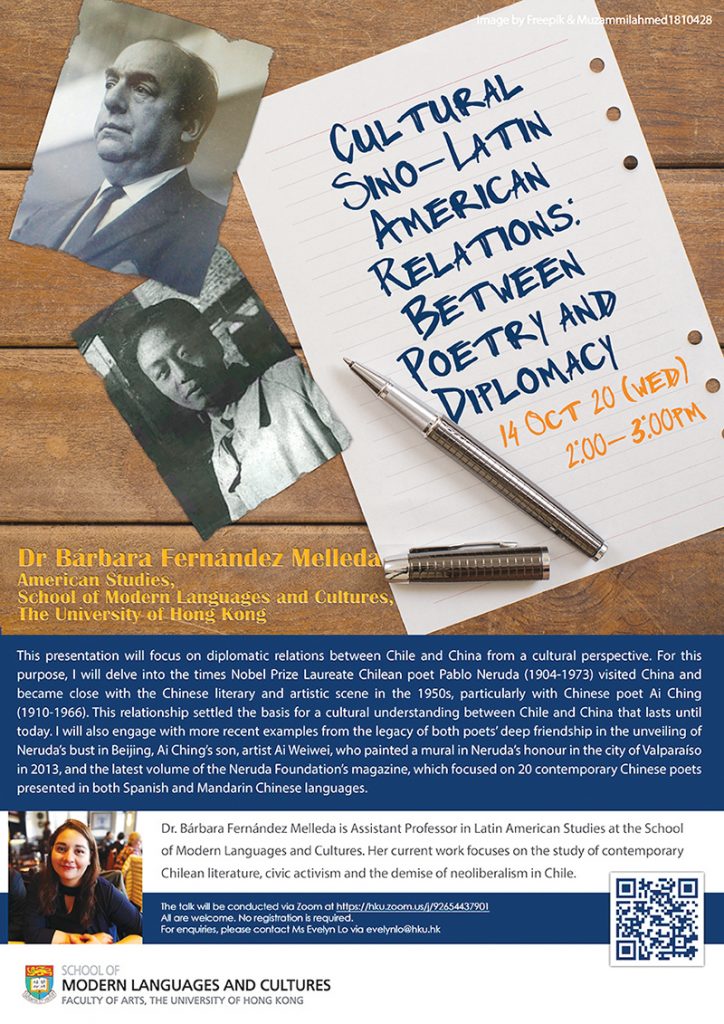May 2021 | Volume 22 No. 2
Poetry in Motion
(Courtesy of FELIPE GAMBOA/AFP via Getty Images)
The discovery of a friendship between Chilean poet Pablo Neruda and Chinese poet Ai Qing in the 1950s became the starting point of research by Dr Bárbara Fernández Melleda, Assistant Professor in Latin American Studies at the School of Modern Languages and Cultures, into diplomatic relations between Chile and China from a cultural perspective.
Nobel Prize Laureate and Chilean poet Pablo Neruda (1904–1973) and Chinese poet Ai Qing (1910–1996) met in the 1950s when Neruda visited China and became close with the Chinese literary and artistic scene. Dr Fernández Melleda’s work – Poets as Friends: Images of Chile in Ai Qing’s Poetry – focusses on how this relationship also settled the basis for a cultural understanding between Chile and China that lasts until today.
Key find in HKU Libraries
She first became aware of the connection between Neruda and Ai when doing research in the HKU Libraries. “While working on Neruda’s Canto general (1950) and the poetisation of América (the continent) I found references to the author’s trips into China,” she said. “I was curious enough to see his own account in his autobiographical work Confieso que he vivido (1974) which was both in original Spanish and English here at the HKU Libraries!
“It was in that text that I found that Neruda was very fond of Ai and that they had a very deep friendship. Ai also visited Chile and wrote poetry while there – he was heavily inspired by the landscape, which is an aspect that I look forward to analysing in depth in my next paper.
“Interestingly, I found that Neruda did not speak Chinese, and Ai did not speak Spanish so the language of communication was French. Neruda studied French at the University of Chile and later resided in Paris as a diplomat to support emigration from Spain in the context of the Civil War. Neruda is known for his humanitarian work and, from this post in Paris, he organised the emigration of over 2,000 Spanish dissidents who arrived in Chile at the Valparaiso port on September 3, 1939 on the cargo ship ‘Winnipeg’.
“Ai, as far as I understand, was schooled in Paris together with a cohort of Chinese poets and writers between 1928 and 1932. Ai and Neruda did not meet in Europe but in China, when the Chilean travelled there to confer the Lenin Peace Prize on Soong Ching-ling in 1951, and Ai was part of a delegation of writers and intellectuals that looked after Neruda’s visit.”
Asked why this has been such a lasting cultural relationship for both countries, Dr Fernández Melleda said: “Considering the distance between Chile and China, it’s clear that having Neruda in the country and, later on Ai visiting Chile was relevant to both their friendship and the diplomatic relationship between both nations. Also, Neruda has been one of the world’s most famous communists and his works have been extensively read in China. He is very much appreciated in the Mainland. Most of his political – or pamphlet – poetry was translated into Chinese quite early, unlike his love poems, for instance, which I believe started being acknowledged even decades later. Neruda’s links with the Soviet Union, China and Cuba were very strong.”

Dr Bárbara Fernández Melleda gave a Zoom presentation titled ‘Cultural Sino-Latin American Relations: Between Poetry and Diplomacy’ in late 2020.
Human component
Today, relationships between China and Chile are mostly economic, however, Dr Fernández Melleda strongly believes that meaningful relationships need a human component, “an identity and that comes inextricably linked with culture and, in this case, poetry.”
“The legacy of Neruda and Ai’s relationship has continued over the years,” she said. There is a monument to Neruda, in the form of a bust, in Beijing. In 2013, Ai Qing’s son, the artist Ai Weiwei, painted a mural in Neruda’s honour in the Chilean port city of Valparaiso where the poet resided. And, the most recent issue of the Pablo Neruda Foundation’s magazine did a lead article focussing on 20 contemporary Chinese poets, presented in both Spanish and Mandarin.
“The Pablo Neruda Foundation decided to commemorate 50 years of relationships between the People’s Republic of China and Chile,” said Dr Fernández Melleda. “Official relationships began on December 15, 1970, during President Salvador Allende’s office. Chile was the first country in the region to recognise the new China and, the first Chilean ambassador to China was another poet, Armando Uribe. Neruda was close to President Allende so I believe one way or another his trips to China helped pave the way for good bilateral relationships at that moment. It is relevant to mention that President Allende was unseated by a US-supported coup d’état in September 1973.
“The Pablo Neruda Foundation sought to commemorate diplomatic relations through poetry, starting with Neruda and Ai, but further developing connections through the publication of a bilingual special issue showcasing the work of 20 contemporary Chinese poets – work translated skilfully by Sun Xintang – so that readers become acquainted with current Chinese poetry as part of an ongoing and fruitful cultural relationship between both countries.”
That relationship continues in various other forms too. Over the last few decades, there has been marked interest in learning Mandarin Chinese in Latin America. The presence of the Confucius Institute has been very relevant, and a growing number of Chinese students are interested in developing research on cultural and literary relationships between China and Latin America in disciplines as varied as translation studies, literature studies and film studies.
Considering the distance between Chile and China, it’s clear that having Neruda in the country and, later on Ai visiting Chile was relevant to both their friendship and the diplomatic relationship between both nations.

DR BÁRBARA FERNÁNDEZ MELLEDA

